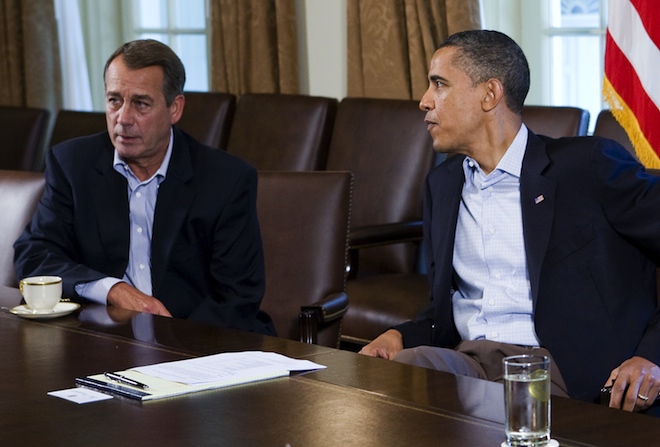When President Obama and the GOP’s primary contenders talk up the 2012 election as a choice for voters between two visions for the country’s future, it’s only about half hyperbole.
We’ll see a prelude of this fact in the months between now and November both on the campaign trail and on Capitol Hill as politicians club each other with their past votes and statements on taxes, Medicare, Social Security, and other potent issues. But it’s not just rhetoric.
To an unappreciated extent, the legislative whipsawing in 2011 has set the country and the parties up for a major reckoning about the role and size of government at the end of next year. And the outcome of the election will help determine which side of the argument wins.
On January 1, 2013, the country’s scheduled to undergo enormous policy shifts automatically. At the stroke of midnight — and in the absence of Congressional action — all of the Bush tax cuts are set to expire; large, automatic cuts to the defense budget, Medicare providers, and other domestic programs are set to kick in; and (most likely) the payroll tax cut will end. Around the same time, the country will once again run out of borrowing authority.
This is an outcome both parties want to avoid. But they disagree profoundly about what ought to happen instead. And so rather than collaborating, Democrats and Republicans will spend 2012 appealing to voters with two fundamentally different approaches to the governing, the economy, the social safety net. And the winner of the presidential election will have a strong claim on which approach we actually take.
Talk to just about any senior aide on Capitol Hill or at the White House and they’ll hint strongly that the work of defusing the New Year’s 2013 time bomb won’t begin in earnest until the lame duck session of Congress in November and December 2012. Neither party is going to cede ground to the other on tax reform when the outcome of the election is at stake. So principals will instead spend the intervening months laying groundwork for a variety of outcomes. A Republican sweep means something much different than Obama’s re-election and Democratic control of one or both houses of Congress.
Democrats will argue for tax reform that raises at least a trillion dollars in revenue more than current policy over the next 10 years. It would come mostly from eliminating tax benefits for wealthy people, while actually lowering rates for the middle class so that the payroll tax cut can expire without hitting the still-suffering middle class. That would also help them retire the $1.2 trillion automatic cuts described above — a consequence of the Super Committee’s failure.
This is a best case scenario for those hoping to hold the line and protect existing social programs. A bad economy will augur well for Republicans and make it difficult for Democrats to back a tax reform that raises revenue. The GOP will push — hard — to extend, or make permanent, all the Bush tax cuts. That means the automatic spending cuts will happen, or be replaced by alternative budget cuts, with trivial, or zero tax revenue to absorb the blow. And then there’s the debt limit, which Republicans have suggested will again be used as a lever to demand deeper cuts to existing programs — no matter who the President is.
That’s a rough sketch for what’s at stake, and why the implications of this year of living dangerously on Capitol Hill are still entirely up in the air.






